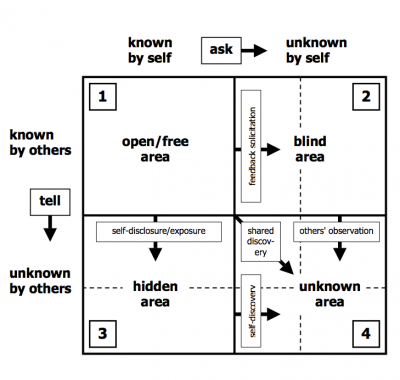
The Johari Window and its relevance for ZEGG-Forum work.

Luft and Ingham (1955) observed that there are aspects of our personality that we are open about and other elements we keep to ourselves. At the same time there are things that others see in us that we are not aware of. There is also an area that everyone is unaware of. Luft and Ingham came up with a model that highlights these four areas and this they called the Johari window.
johari quadrant 1 - 'open self/area' or 'free area' or 'public area', or 'arena' is also known as the 'area of free activity'. This is the information about the person - behaviour, attitude, feelings, emotion, knowledge, experience, skills, views, etc - known by the person ('the self') and known by the group ('others').
The aim in any group should always be to develop the 'open area' for every person, because when we work in this area with others we are at our most effective and productive, and the group is at its most productive too. The open free area, or 'the arena', can be seen as the space where good communications and cooperation occur, free from distractions, mistrust, confusion, conflict and misunderstanding.
Established team members logically tend to have larger open areas than new team members. New team members start with relatively small open areas because relatively little knowledge about the new team member is shared. The size of the open area can be expanded horizontally into the blind space, by seeking and actively listening to feedback from other group members. This process is known as 'feedback solicitation'. Also, other group members can help a team member expand their open area by offering feedback, sensitively of course. The size of the open area can also be expanded vertically downwards into the hidden or avoided space by the person's disclosure of information, feelings, etc about him/herself to the group and group members. Also, group members can help a person expand their open area into the hidden area by asking the person about him/herself.
johari quadrant 2 - 'blind self' or 'blind area' or 'blindspot' is what is known about a person by others in the group, but is unknown by the person him/herself. By seeking or soliciting feedback from others, the aim should be to reduce this area and thereby to increase the open area, to increase self-awareness. This blind area is not an effective or productive space for individuals or groups. This blind area could also be referred to as ignorance about oneself, or issues in which one is deluded. A blind area could also include issues that others are deliberately withholding from a person. We all know how difficult it is to work well when kept in the dark. No-one works well when subject to 'mushroom management'. People who are 'thick-skinned' tend to have a large 'blind area'.
Group members can take some responsibility for helping an individual to reduce their blind area - in turn increasing the open area - by giving sensitive feedback and encouraging disclosure. Managers should promote a climate of non-judgemental feedback, and group response to individual disclosure, which reduces fear and therefore encourages both processes to happen.
johari quadrant 3 - 'hidden self' or 'hidden area' or 'avoided self/area' or 'facade' is what is known to ourselves but kept hidden from, and therefore unknown, to others. This hidden or avoided self represents information, feelings, etc, anything that a person knows about him/self, but which is not revealed or is kept hidden from others. The hidden area could also include sensitivities, fears, hidden agendas, manipulative intentions, secrets - anything that a person knows but does not reveal, for whatever reason. It's natural for very personal and private information and feelings to remain hidden, indeed, certain information, feelings and experiences have no bearing on work, and so can and should remain hidden. However, typically, a lot of hidden information is not very personal, it is work- or performance-related, and so is better positioned in the open area.
Relevant hidden information and feelings, etc, should be moved into the open area through the process of 'disclosure'. The aim should be to disclose and expose relevant information and feelings - hence the Johari Window terminology 'self-disclosure' and 'exposure process', thereby increasing the open area. By telling others how we feel and other information about ourselves we reduce the hidden area, and increase the open area, which enables better understanding, cooperation, trust, team-working effectiveness and productivity. Reducing hidden areas also reduces the potential for confusion, misunderstanding, poor communication, etc, which all distract from and undermine team effectiveness.
johari quadrant 4 - 'unknown self' or 'area of unknown activity' or 'unknown area' contains information, feelings, latent abilities, aptitudes, experiences etc, that are unknown to the person him/herself and unknown to others in the group. These unknown issues take a variety of forms: they can be feelings, behaviours, attitudes, capabilities, aptitudes, which can be quite close to the surface, and which can be positive and useful, or they can be deeper aspects of a person's personality, influencing his/her behaviour to various degrees. Large unknown areas would typically be expected in younger people, and people who lack experience or self-belief.
When we ask for feedback or mirrors in a ZEGG-Forum, we can extend area 1 into 2 as we learn more about ourselves by others.
If we share more about ourselves in the middle of a ZEGG-Forum as the presenter, we extend area 1 into area 3.
When we enter a ZEGG-Forum as the presenter, we also enter the unknown, or quadrant 4 and often find ourselves discovering something about ourselves that we and others did not see before. We start reducing our shadow.
Citations
Ina Meyer-Stoll and Achim Ecker (2013). ZEGG-Forum and the Johari Window: The Johari Window and its relevance for ZEGG-Forum work.. Grassroots Economic Organizing (GEO). https://geo.coop/story/zegg-forum-and-johari-window

Add new comment